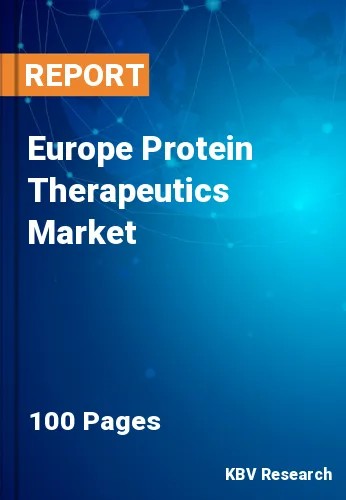The Europe Protein Therapeutics Market would witness market growth of 6.5% CAGR during the forecast period (2022-2028).
Comparing protein treatments to small-molecule medicines, there are various benefits. First, proteins frequently perform a variety of intricate and highly complex tasks that cannot be duplicated by straightforward chemical substances. These estimations present a significant challenge to modern medicine from the perspective of disease processes since each one of these proteins can cause disease if it has mutations or other abnormalities, or if its concentration is unusually high or low.
But when observed from the standpoint of therapeutics, these estimations provide an excellent opportunity to use protein therapies to treat disease. The US Food and Drug Administration (FDA) has currently approved the use of more than 130 distinct proteins or peptides, and many more are in the development stage. Furthermore, because proteins behave in extremely precise ways, there is frequently less chance that using protein therapies may disrupt regular biological functions and have unfavorable effects.
Moreover, because many of the therapeutic proteins are produced by the body naturally, these drugs are frequently well tolerated and less likely to trigger immunological reactions. Protein treatments can offer effective replacement therapy without the requirement for gene therapy that is not currently available for the majority of genetic illnesses, for diseases in which, a gene is mutated or deleted.
The European economy is supported by the industry for plasma-derived medicines. These economic repercussions take the form of induced, indirect, and direct effects. To put it another way, in addition to the direct impact on the industry that produces plasma-derived medicines, the economic impacts ripple through the entire supply chain, including contractors as well as the value that is created for employees. The number of licensed biosimilars is anticipated to rise in the following years due to the imminent patent cliff for a number of blockbuster therapeutic protein medicines.
The Germany market dominated the Europe Protein Therapeutics Market by Country in 2021, and would continue to be a dominant market till 2028; thereby, achieving a market value of $32,064.9 million by 2028. The UK market is exhibiting a CAGR of 5.6% during (2022 - 2028). Additionally, The France market is poised to grow at a CAGR of 7.2% during (2022 - 2028).
Based on Product, the market is segmented into Monoclonal Antibodies, Human Growth Hormone, Fusion Protein, Insulin, Erythropoietin, Interferon and Follicle Stimulating Hormone. Based on Application, the market is segmented into Metabolic Disorders, Immunologic Disorders, Hematological Disorders, Cancer, Hormonal Disorders, Genetic Disorders and Others. Based on countries, the market is segmented into Germany, UK, France, Russia, Spain, Italy, and Rest of Europe.
Free Valuable Insights: The Global Protein Therapeutics Market will Hit $490.2 Billion by 2028, at a CAGR of 6.9%
The market research report covers the analysis of key stake holders of the market. Key companies profiled in the report include Abbott Laboratories, Baxter International, Inc., Amgen, Inc., F. Hoffmann-La Roche Ltd., Eli Lilly and Company, Merck & Co., Inc., Johnson & Johnson (Janssen Global Services, LLC), Pfizer, Inc., Novo Nordisk A/S and Sanofi S.A.
By Product
By Application
By Country
Our team of dedicated experts can provide you with attractive expansion opportunities for your business.

